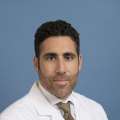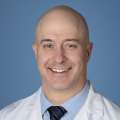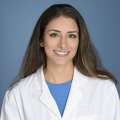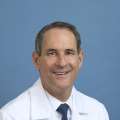Joint Replacement Fellowship
Overview
The UCLA Adult Reconstruction fellowship was conceptualized to provide highly specialized and comprehensive training for orthopaedic surgeons who desire to perform total joint arthroplasty in a high volume setting, treat complex deformity, and perform revision arthroplasty in either an academic or community setting. Fellows completing our program will receive extensive operative training in primary and revision arthroplasty with an emphasis on evidence and value based delivery of care.
Fellows will perform patient evaluations in clinic and be expected to successfully indicate patients for primary and revision arthroplasty. A systematic approach to the work-up of painful native and prosthetic joints will be emphasized. Procedural templating, implant selection, and postoperative rehabilitation plans will be coordinated preoperatively with attending mentors such that pitfalls are avoided and technical pearls gleaned.
The operative experience within our fellowship will be vast. Fellows will become proficient with anterior and posterior approaches to the hip. They will perform medial parapatellar and mid-vastus approaches to the knee. Extensile approaches for revisions, including extended trochanteric osteotomies for the hip and quad snips for the knee will be performed. They will further be exposed unicompartmental and patellofemoral arthroplasty as well. Robotics and computer navigation will be incorporated into the curriculum for appropriate patients and clinical indications. Complex revisions for aseptic loosening, infection, and periprosthetic fractures will be performed. Many techniques for dealing with bone loss will be employed including the use of augments, metaphyseal cones, and allografts. Extensor mechanism reconstruction around the knee will also be performed. Finally exposure to open hip preservation techniques including surgical dislocation, femoral osteotomies, and periacetabular osteotomies will be available.
The fellow will be allowed to take independent trauma call on a volunteer basis. They will be compensated for this call and expected to operate independently when performing call cases.
Clinical Practice
UCLA Santa Monica Medical Center and Orthopaedic institute is level-2 trauma center with close to 300 inpatient beds. We are a tertiary referral center for complex primary and revision arthroplasty procedures. The UCLA medical system casts a wide net and generates a substantial number of primary referrals as well.
Each of our two fellows will spend 3 months with each of our full time faculty mentors and another 3 months split between our 2, part-time faculty members. The fellow will be exposed to a wide array of pathology and techniques, as described above. A typical week will involve 2-3 days in the operating room, 1-2 days in an outpatient clinic, and 0.5-1 day of research per week.
Research
Each fellow will have on average one day per week for research pursuits and other academic endeavors. They will be expected to complete submission of at least one peer reviewed article and present original research at a regional or national meeting. Given the wide array of clinical research interests being pursued by our faculty there are a number of current ongoing projects that fellows will also have an opportunity on which to contribute their efforts.
The UCLA campus is host to a multitude of research settings including microbiology and biomechanics labs that fellows will also have at their disposal for further “basic science” research.
Educational Program
- Fellows will participate in all divisional conferences and the majority of regularly reoccurring departmental conferences as well (Grand Rounds, morbidity and mortality, invited lectureships)
- Fellows will present at weekly divisional conference meetings to go over challenging cases from the previous and up-coming week;
- There will be a weekly didactic conference where faculty and fellows will be responsible for lecturing the residents and other care providers on the service (including ARNP’s, RN’s, and PA’s);
- Quarterly arthroplasty journal clubs/case conferences will be held with other local academic arthroplasty programs to foster an exchange of ideas;
- Monthly research meetings will also be held with faculty mentors to ensure progress on ongoing studies and discuss new study ideas;
- Fellows will also have access to cadaveric labs and workshops throughout the year on a regular basis.
Program Information
Patient Care
The Fellow will be instructed in and expected to provide patient centered care focusing on bio, psycho, and social aspects of care delivery and optimization. Appropriate and respectful treatment of patients from all walks of life and cultural backgrounds will be mandatory. Specifically fellows will need to meet the following objectives:
- Demonstrate patient centered care
- Obtain an accurate and meaningful history of present illness
- Perform a focused physical exam
- Order and interpret appropriate supporting laboratory studies and imaging
- Formulate a comprehensive problem list for the patient that includes not only orthopaedic problems but other relevant patient co-morbidities
- Determine appropriate non-operative and operative treatment plans for patients based on the aforementioned information gathering
- Identify significant risks for post-operative complications and formulate strategies and treatment plans to avoid them
- Manage surgical wounds in an arthroplasty patient
- Diagnose and manage early postoperative complications
- Formulate post-operative recovery plans for surgical patients
- Counsel patients and their care partners regarding post-operative expectations and their expected recovery progress over time
- Be part of the inpatient team with inpatient responsibilities including daily rounds, orders, prescriptions, dismissal instructions, and coordination of post-operative care.
- Perform primary arthroplasty surgery in the setting of arthritis and trauma
- Perform revision arthroplasty surgery under attending supervision
Medical Knowledge
The Fellow must demonstrate comprehensive understanding of the principles of total joint arthroplasty including joint biomechanics, implant design, biologic interactions occurring between patients and implants, and tribology. The Fellow must demonstrate active independent learning related to recent literature and mastery of historic literature of import. They must further integrate this knowledge in their care of patients. Further objectives include:
- Mastery of surgical anatomy of the hip and knee
- Comprehensive knowledge of various implant systems and the distinguishing features of these implants and or patient scenarios requiring their preferential employment
- Know and cite outcomes related to primary and revision total joint arthroplasty
- Understand and employ the appropriate work-up for failed arthroplasty
- Know common modes of failure for various arthroplasty implants and foster clinical practices that avoid them
Learning and Improvement
The Fellow will be expected to learn throughout the year and demonstrate this commitment to learning on a regular basis. Evidence based care will be stressed and the Fellow will be expected to investigate various treatments and their outcomes so that advances may be integrated into patient care throughout their careers. Fellows will further be expected to:
- Evaluate their own performance and knowledge, requesting feedback from faculty mentors and co-fellows
- Amplify self-directed learning in areas where deficiencies are recognized or indicated by faculty
- Appraise literature and assimilate evidence from published works into their practice appropriately
- Effectively present cases to faculty with poignant literature references related to similar presentations or techniques
- Meaningfully participate in conferences
- Affectively teach junior residents and serve as a resource to ancillary staff as a member of the care team
Professionalism and Communication
The Fellow will be expected to behave in a professional manner with patients, their families, and other members of the care team and hospital staff. They will be expected to communicate effectively and respectfully with these individuals as well. Objectives related to these requirements include:
- Conducting oneself with respect and compassion for patients and colleagues
- Demonstrate honesty, reliability, punctuality, and integrity
- Accept responsibility for actions and words
- Communicate directly and respectfully with patients, families, and staff members
- Complete notes, dictations, and consults in a timely manner
- Understand when direct communication is preferred over delayed or electronic communication
- Demonstrate active listening skills
- Promote teamwork and collegiality

Training Institution
UCLA Santa Monica Medical Center
UCLA Santa Monica Medical Center serves as the cornerstone of UCLA Health's Santa Monica medical campus. The 281-bed, full-service medical center provides the complete continuum of healthcare services in a technologically advanced and welcoming facility. It combines the expertise of an academic medical center with the accessibility of a community hospital to offer patients the best of both medical worlds.
Program Team
Contact Information
Program Coordinator: Rebecca Reyes
Email:



